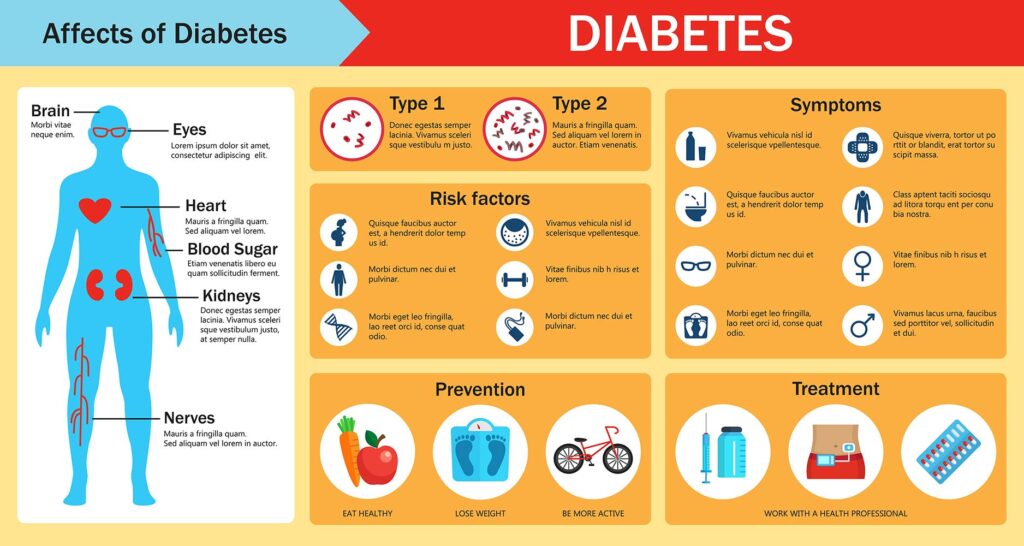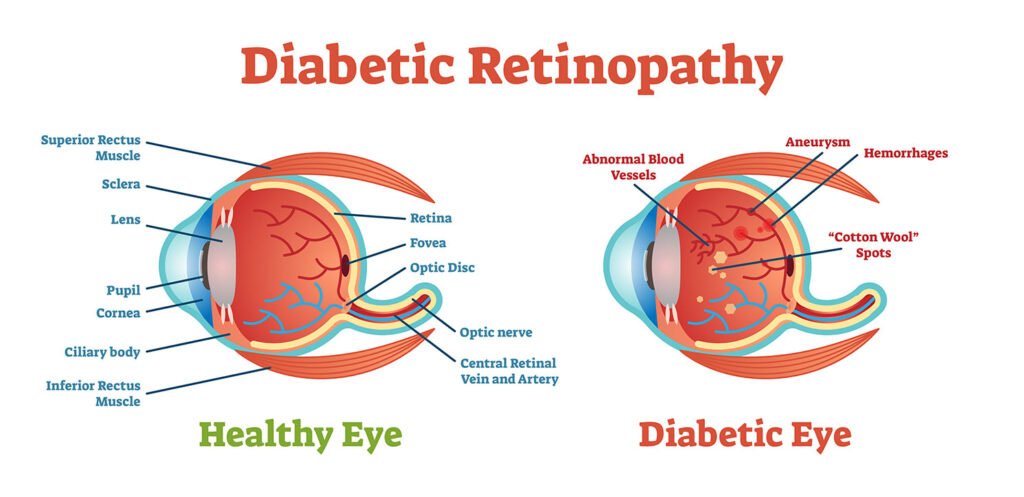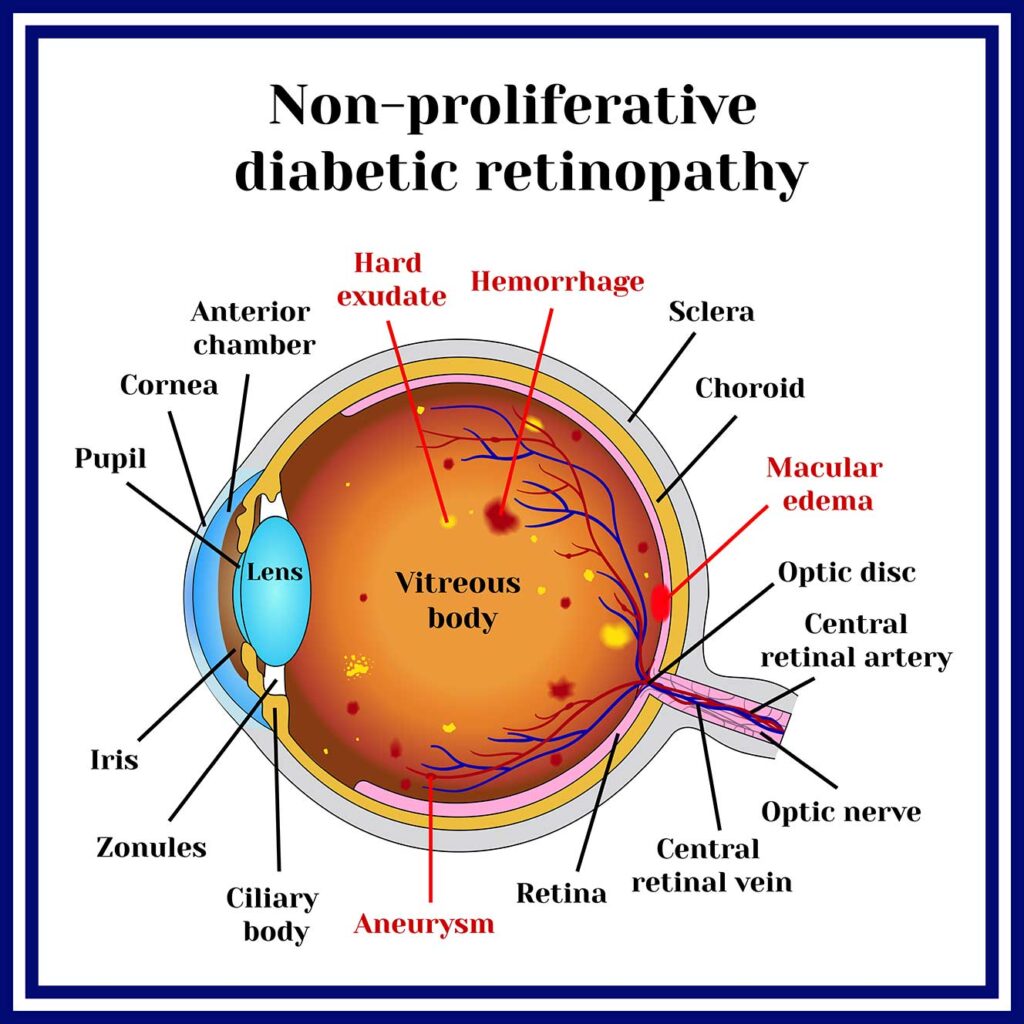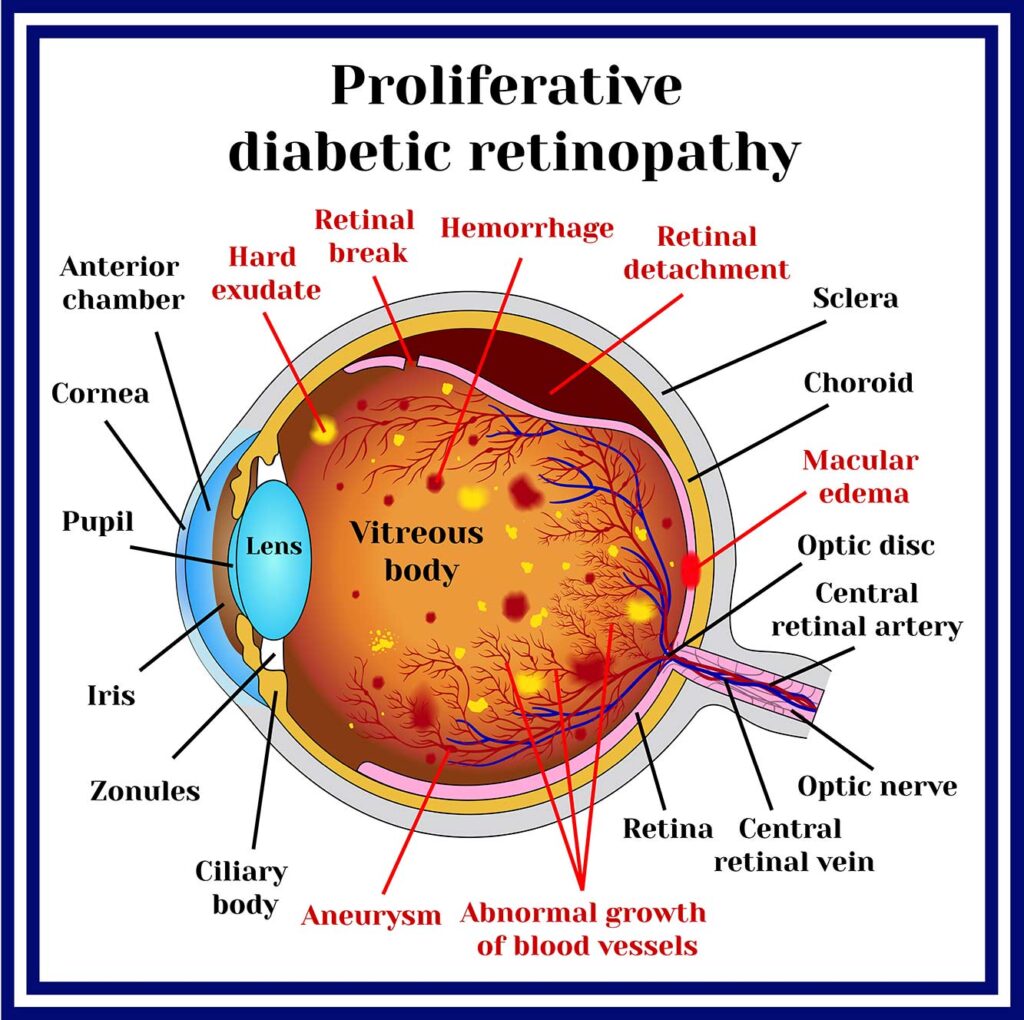Diabetic Eyecare
Diabetes can cause blindness, don't neglect your eyes
Have Any Query?
Enter Your Mobile Number For Call back
What is Diabetes?
Diabetes Mellitus is a disease in which the body does not use and store sugar properly. High blood sugar levels affect the small blood vessels of all the organs of the body, especially the eyes, heart, kidney and nerves. India is known as the Diabetic capital of the world with a rapidly increasing number of people suffering from Diabetes. Presently, there are more than 77 million diabetics in India, almost 12% of urban population. Diabetic Eye Disease is one of the leading causes of blindness in the world.

What is Diabetic Eye Disease?
Diabetes can affect your eyes in many ways, most prominent being Diabetic retinopathy. Prolonged and uncontrolled diabetes inevitably damages the microvasculature (small blood vessels) of the Retina, which is the sensitive layer at the back of the eye that senses light and sends signals to the brain. This damage to the Retina is called Diabetic Retinopathy. The blood vessels become leaky and can lead to swelling in the retina called Diabetic Macular edema. Diabetics are also at risk for developing early Cataract, Glaucoma, stye, orbital cellulitis and Nerve paralysis. If not detected and treated on time, diabetes can cause irreversible damage to your vision even resulting in blindness. Hence, it is extremely important to keep your diabetes under control and get a complete eye examination at least once a year.

Types of Diabetic Retinopathy
Nonproliferative Diabetic Retinopathy (NPDR)
Is an early stage of diabetic retinopathy in which the tiny blood vessels within the retina(capillaries) leak blood or fluid. This causes the retina to swell or to form deposits called exudates. Mild NPDR does not affect vision and can be managed with good control of blood sugar. However, moderate to severe NPDR adversely affects vision due to Macular Edema or Macular Ischemia.Macular Edema
Is the swelling or thickening of the Macula, the central part of the retina that allows us to see finer details. It is the most common cause of visual loss due to diabetes.
Macular Ischemia
Occurs due to closure of small blood vessels(capillaries) due to which the macula does not receive adequate blood supply, hence cannot function causing vision to be permanently affected.
Proliferative Diabetic Retinopathy (PDR)
Is the late stage of Diabetic Retinopathy leading to severe visual loss. Due to growth of abnormal new vessels (Neovascularisation) on the retina or optic disc. These new vessels are fragile and leaky and lead to scar tissue that can cause several complications such as Tractional detachment of the retina (retina separates from its normal position) and Vitreous haemorrhage (blood collection in the central jelly of the eye), which require surgery. Sometimes new vessels can grow on the iris and block the normal flow of fluid out of the eye leading to increase in eye pressure.This is called Neovascular Glaucoma that needs medical or surgical treatment otherwise can lead to permanent damage to the optic nerve resulting in blindness.

How is Diabetic Retinopathy treated?
Depending on the stage of Diabetic Retinopathy, different treatment modalities are advised. However, no treatment can be successful unless there is control of blood sugar, BP and cholesterol.

This is recommended for patients who have Macular Edema, PDR or Neovascular Glaucoma.Focal Laser helps to close the leaky blood vessels and prevent further bleeding. Panretinal photocoagulation is done for Proliferative Diabetic Retinopathy(PDR) in the periphery of the retina to destroy the diseased parts to stop release of Vascular Endothelial Growth factor (VEGF) that promotes growth of new blood vessels. It causes the abnormal vessels to shrink. Multiple laser treatments are sometimes necessary. Laser does not cure PDR, it helps to avoid further visual loss.
These are given inside the eye to reduce the growth of abnormal new vessels and fluid leaks. Steroid Injections like Ozurdex or Triamcinolone or Anti VEGF injections like Aflibercept, bevacizumab, Ranibizumab.Your Retina specialist will advise which is best suited for your eyes. Repeated injections are usually required.

In advanced cases with non resolving Vitreous Haemorrhage or Retinal detachment surgery maybe the only answer. Today with advanced technology and highly skilled Retina specialists at Vision Plus eye Centre we are able to deliver excellent results even in complicated cases.

This is recommended for patients who have Macular Edema, PDR or Neovascular Glaucoma.Focal Laser helps to close the leaky blood vessels and prevent further bleeding. Panretinal photocoagulation is done for Proliferative Diabetic Retinopathy(PDR) in the periphery of the retina to destroy the diseased parts to stop release of Vascular Endothelial Growth factor (VEGF) that promotes growth of new blood vessels. It causes the abnormal vessels to shrink. Multiple laser treatments are sometimes necessary. Laser does not cure PDR, it helps to avoid further visual loss.
These are given inside the eye to reduce the growth of abnormal new vessels and fluid leaks. Steroid Injections like Ozurdex or Triamcinolone or Anti VEGF injections like Aflibercept, bevacizumab, Ranibizumab.Your Retina specialist will advise which is best suited for your eyes. Repeated injections are usually required.

In advanced cases with non resolving Vitreous Haemorrhage or Retinal detachment surgery maybe the only answer. Today with advanced technology and highly skilled Retina specialists at Vision Plus eye Centre we are able to deliver excellent results even in complicated cases.

FAQs
- Diabetes patients, both Type 1 (Juvenile onset) or Type 2 (Adult onset) Long Standing diabetes > 5 years
- Uncontrolled blood sugar
- High BP
- High cholesterol
- Smoking
- Certain ethnic groups are predisposed
- Pregnant women
There may be no symptoms at an early stage, and by the time the patient has symptoms, damage has already occurred. Hence, it is critical to have regular eye check ups.
A few common symptoms include
- Blurred vision
- Fluctuating vision
- Black spots or floaters
- Frequent change in glasses number
- Double vision
- Flashes of light
- Shadow/ curtain in front of your eyes
A yearly retina examination by your eye specialist can detect retinopathy at an early stage.
Early detection and treatment can prevent serious visual loss. After checking your vision, eye pressure and examining the front part of your eye, your pupils will be dilated for a fundus examination. Your doctor will do a 90D Biomicroscopy and Indirect Ophthalmoscopy to see your retina for any haemorrhages, exudates, edema and new blood vessels. You may be advised special tests like Fundus Photograph, OCT Angio or Fundus Fluorescein Angiography. Your doctor may advise self testing at home by Amsler Grid.
A healthy lifestyle can alter the course of Diabetic Eye Disease, along with with a regular follow up with your Endocrinologist and Nephrologist
- Healthy blood sugar levels
- HbA1C levels done every 3 months, keeping it under 7%
- Control of Blood pressure
- Normal Lipid profile- LDL cholesterol< 100
- Healthy Kidney function- By checking Urine microalbuminuria
- Haemoglobin should be > 12gm%
- Regular exercise, healthy diet, and avoiding smoking

